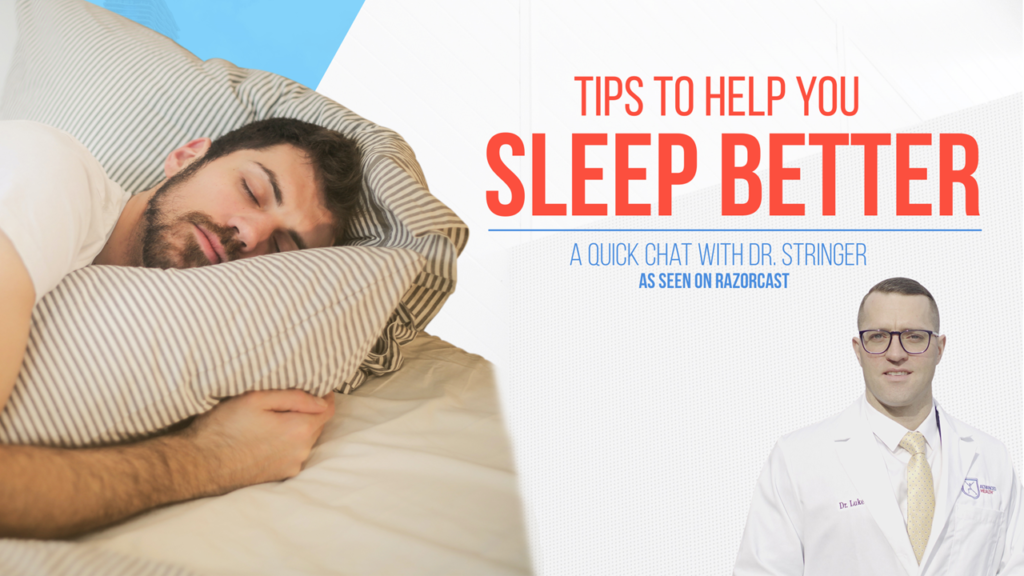
Sleeping is a critical component to how we function both on a physical and physiological level, and the amount of sleep that we get is really important, too. Research is clear that the right amount of sleep is between six and nine hours. Too little or too much sleep can have a detrimental effect on how we feel and how we function physically and physiologically. The key part of sleeping is when we enter REM, rapid eye movement. This is where we allow the body to function into what we call the parasympathetic nervous system, which is where we rest and digest. That is when we clean cells and reboot the bodily systems so the next day we can be up and functioning.
Here are some tips you can follow to improve the quality of your sleep:
- Your bedroom should be just for sleeping. Try to make it a room where you’re just going in there to sleep, and you’re not on your tablet, on your phone or watching television.
- Limit your screen time after a certain hour. Blue light excites the nervous system. If you’re staring at your screen just before you go to bed, you’re actually stimulating yourself, so that can interfere with your sleep.
- Switch off the wifi and put your phone on airplane mode so you are not getting interference with the wifi signal.
- Keep your room dark. Blackout your blinds so it is completely dark.
- Try supplements like herbal teas such as valerian root. You can also supplement with melatonin. You need to be reaching out to your healthcare provider just to make sure these supplements are good for you to take and to determine your proper dosage.
- Get exercise during the day. Exercising daily is important for functioning at an optimal level but when you are exercising is critically important. You do not want to exercise too close to bed because when you exercise, it releases endorphins. Endorphins make us feel better and function better, they also excite us and wake us up. So, if you’re trying to get to bed at 10:00 PM, but you’re working out at 8:00 PM, that’s going to be difficult for your body to reset, adjust and switch from being switched on and moving to resting and sleeping. Exercise is absolutely going to help with our sleep patterns, but make sure we’re exercising at the right time.
- Choose the best mattress for your spine. The shape of your spine dictates the type of mattress you should have. If you have a lot of curve in your lower back and you’ve got anterior pelvic tilt, you want to be sleeping on a firm mattress rather than on a soft mattress because a soft mattress is just going to increase that curve further. The counter of that is if you are hypo-orthotic, you don’t have enough curve in your lower back, you’ll need a softer mattress because that little bit of give in the mattress is going to allow that curve to come into the spine and that is going to benefit the spine.
- Try sleeping on your back or on your side. Laying on our back is the best position to sleep in. Imagine you’re laying flat in your bed and someone is looking at you from the side. Your ear should be on top of your shoulder. If you have too much of a pillow, it’s going to raise your head up and your ear is going to be in front of the shoulder and that is going to create neck tension. Then if you don’t have enough of a pillow, your head might sink backwards behind your shoulder and that’s going to create stress and tension in your neck and upper back. Your shoulder should be aligned with your pelvis with a nice neutral torso and legs flat. If you’re looking down from a bird’s eye view, then your nose, your sternum, and your pelvis should be in alignment. If you choose to sleep on your side, you want your shoulder just rolled underneath you. If you’re looking head on, the nose, sternum, and pelvis should be in alignment. If you’ve got too much of a pillow, it’s going to create an acute angle between your ear and the shoulder that’s not touching the mattress and that is going to create a lot of pain. And if you don’t have enough pillow, then you’re going to have an acute angle between the shoulder and the ear of the side that you’re sleeping on. Keeping a neutral position is your goal.
These are all things that you can do that can make a positive impact on the quality of sleep you are trying to get.
